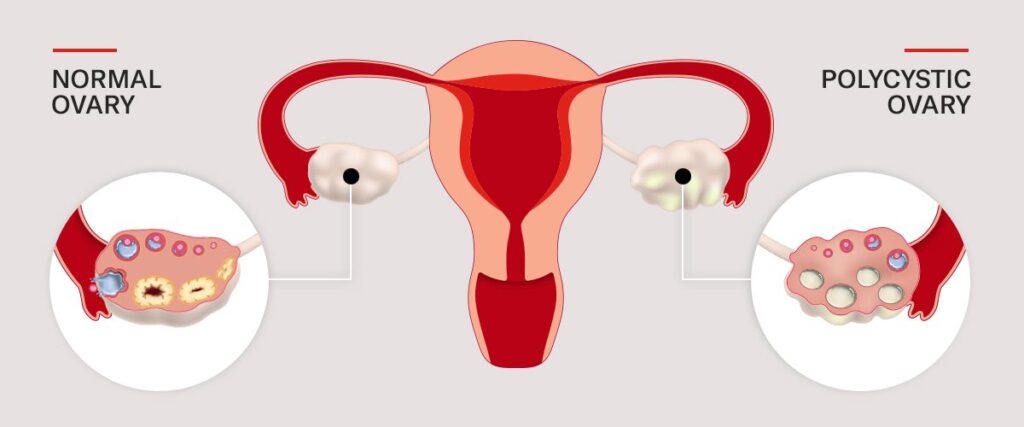PCOS in women, or Polycystic Ovarian Syndrome, stands as one of the most prevalent hormonal imbalance disorders among women and girls within the reproductive age bracket.

Its manifestation is diverse, presenting a range of symptoms such as acne, increased hair growth, irregular menstrual cycles, body pigmentation, and challenges in conception. Nearly half of those affected may also grapple with obesity.
It occurs due to hormonal imbalance with a tripping in balance towards androgens, (the male hormones which are also made to a small extent by the ovaries. This leads to acne and extra hair growth. It also affects the normal process of egg formation in the ovaries which leads to delayed periods with low flow, and problems in conceiving and getting pregnant.
Insulin resistance may occur which leads to inappropriate control of blood sugar.
Treatment of PCOS mainly involves lifestyle modifications, , with exercise & diet regulation and weight loss (in obese PCOS). In additional the treatment has to be tailored to individual patients’ need, with a combination of oral contraceptive pills , and insulin resistance lowering drugs.
For conception problems the treatment is induction of ovulation with clomiphene citrate and hormonal injections as required.
Navigating PCOS in women requires a multifaceted approach, emphasizing lifestyle adjustments alongside tailored medical interventions. By addressing the underlying hormonal imbalance and its diverse effects, individuals can better manage symptoms and improve their reproductive health.
For those experiencing PCOS it is very crucial or suggested to consult a gynecologist as soon as possible so it could be treated on time. So, As a leading female gynecologist in Delhi experienced in PCOS treatment, Dr. Yuvakshi Juneja specializes in providing personalized care for women facing PCOS challenges. Her expertise and tailored treatments have helped numerous women manage and overcome the complexities of PCOS.
Frequently Asked Questions
1. Does PCOS cause hair loss?
Yes, PCOS (Polycystic Ovarian Syndrome) can cause hair loss. This is due to the hormonal imbalance associated with PCOS, particularly an increase in androgens (male hormones) which can lead to thinning hair on the scalp, a condition known as androgenic alopecia.
2. How do I check if I have PCOS?
Check for PCOS by looking for symptoms like irregular periods, excessive hair growth, acne, and weight gain, and consult a gynecologist for a physical exam, blood tests, and an ultrasound.
3. How is PCOS confirmed?
PCOS is confirmed through a review of symptoms, a physical examination, blood tests for hormone levels, and an ultrasound to detect ovarian cysts.
